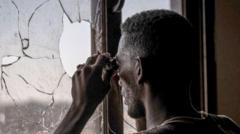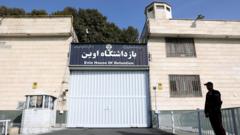**Amina's dream of becoming a doctor is indicative of many young Afghan women whose hopes for education are now tied to religious schools that may not fulfill their academic aspirations.**
**Afghan Girls' Education Crisis: Madrassas Become the New Norm for Learning**

**Afghan Girls' Education Crisis: Madrassas Become the New Norm for Learning**
**With over a million girls barred from school due to Taliban policies, madrassas emerge as the sole educational refuge amid ongoing challenges in Afghanistan.**
In Afghanistan, the educational landscape for girls has drastically changed since the Taliban's return to power in 2021. Amina, now 15, recalls her life-altering moment at age 12 when her dreams of pursuing education like boys were shattered. The Taliban's restrictions have persisted for four consecutive years, affecting more than one million girls across the nation, according to Unicef.
Once aimed at becoming a doctor after her own life was saved by a female surgeon, Amina's aspirations now lie in ruins, as she finds herself at the Al-Hadith madrassa, a private religious center that has taken in many young women denied access to schools. "I wanted to get an education so that I could become a doctor," she laments.
While madrassas have stepped in to provide education, they often focus predominantly on religious teachings rather than a comprehensive academic curriculum. Families with the means may opt for private tutoring to access subjects such as mathematics and sciences, leaving many young women with limited educational opportunities. Concerns about the madrassas being breeding grounds for extremist ideology have also surfaced, highlighting the challenges faced by Afghan girls.
Al-Hadith madrassa, where Amina studies, was founded by her brother Hamid, who wanted to support her quest for knowledge amid repression. "When girls were denied education, my sister's dream of becoming a heart surgeon was crushed," he states. In response to mental and emotional struggles stemming from educational denial, such institutions strive to provide a sense of normalcy and connection among girls.
Another madrassa, the Shaikh Abdul Qadr Jilani, caters to over 1,800 girls, ranging from five to 45 years old. It showcases a similar environment, lacking basic facilities yet fostering an atmosphere of learning. Part of the curriculum blends religious subjects with academic studies, yet proof of the latter is scant.
Individuals like Hadiya, who recently graduated, represent a generation of girls yearning for knowledge in various fields. Despite the barriers, they remain resilient, advocating for the importance of education and meaningful learning experiences. “Educational institutions, including mainstream schools and universities, are absolutely essential for our society," asserts teacher Safia.
The UN has voiced alarm regarding the education regime imposed by the Taliban, decrying the limits placed on women and asserting the urgent need to restore educational avenues for older girls. Mr. Richard Bennett has emphasized the potential risks associated with such restrictive education, which could lead to radical ideologies.
The Taliban claims millions are enrolled in madrassas as they promise to reopen girls' schools under specific conditions; however, these promises have yet to come to fruition. As Amina continues to dream of becoming a heart surgeon, her unwavering hope reflects a broader yearning among many young Afghan women for a return to a future with educational freedom and opportunities.
Once aimed at becoming a doctor after her own life was saved by a female surgeon, Amina's aspirations now lie in ruins, as she finds herself at the Al-Hadith madrassa, a private religious center that has taken in many young women denied access to schools. "I wanted to get an education so that I could become a doctor," she laments.
While madrassas have stepped in to provide education, they often focus predominantly on religious teachings rather than a comprehensive academic curriculum. Families with the means may opt for private tutoring to access subjects such as mathematics and sciences, leaving many young women with limited educational opportunities. Concerns about the madrassas being breeding grounds for extremist ideology have also surfaced, highlighting the challenges faced by Afghan girls.
Al-Hadith madrassa, where Amina studies, was founded by her brother Hamid, who wanted to support her quest for knowledge amid repression. "When girls were denied education, my sister's dream of becoming a heart surgeon was crushed," he states. In response to mental and emotional struggles stemming from educational denial, such institutions strive to provide a sense of normalcy and connection among girls.
Another madrassa, the Shaikh Abdul Qadr Jilani, caters to over 1,800 girls, ranging from five to 45 years old. It showcases a similar environment, lacking basic facilities yet fostering an atmosphere of learning. Part of the curriculum blends religious subjects with academic studies, yet proof of the latter is scant.
Individuals like Hadiya, who recently graduated, represent a generation of girls yearning for knowledge in various fields. Despite the barriers, they remain resilient, advocating for the importance of education and meaningful learning experiences. “Educational institutions, including mainstream schools and universities, are absolutely essential for our society," asserts teacher Safia.
The UN has voiced alarm regarding the education regime imposed by the Taliban, decrying the limits placed on women and asserting the urgent need to restore educational avenues for older girls. Mr. Richard Bennett has emphasized the potential risks associated with such restrictive education, which could lead to radical ideologies.
The Taliban claims millions are enrolled in madrassas as they promise to reopen girls' schools under specific conditions; however, these promises have yet to come to fruition. As Amina continues to dream of becoming a heart surgeon, her unwavering hope reflects a broader yearning among many young Afghan women for a return to a future with educational freedom and opportunities.




















